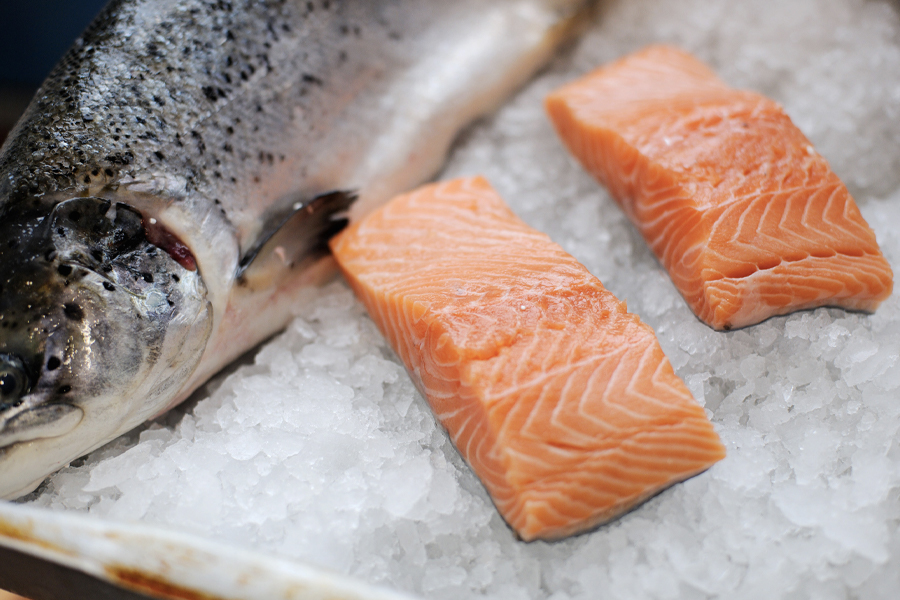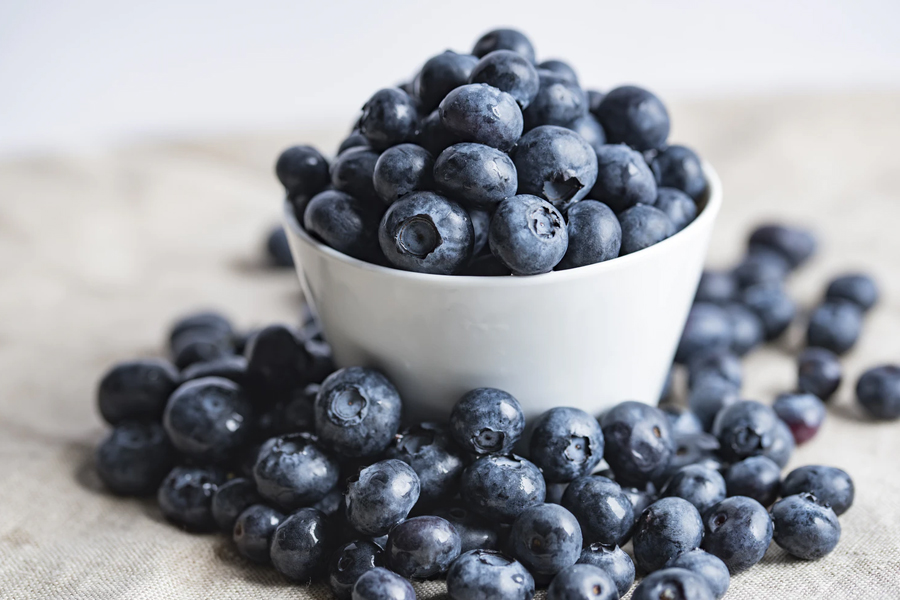
Published:
Readtime: 11 min
Every product is carefully selected by our editors and experts. If you buy from a link, we may earn a commission. Learn more. For more information on how we test products, click here.
If you have ever felt a little down in the dumps, chances are you’ve found yourself rummaging through the fridge or cupboard for a quick pick-me-up. It’s not just boredom hunger, in fact, the psychological link between mood and food is far more ingrained than we think. It’s no secret that the fuel that we put in our bodies has the ability to transform our physical health, but that encompasses our mental health as well. According to Luke Hines, nutritional therapy practitioner, nine times best-selling cookbook author and Amazonia ambassador, understanding what your body needs to function for brain health, heart health and overall nutrition is paramount.
“The food we eat and their results on our mood are intrinsically linked, and once understood what foods we thrive on and what foods we dive on, we can eat in a way that is conducive to managing mental health, energy, focus and our overall feeling of wellbeing,” Hines tells Man of Many. “The role of diet and nutrition on mental health is very complex and has yet to be fully understood, with more and more research pointing to a very strong link.”
You’ll also like:
9 Epic Health Benefits of Avocado
15 Best Healthy Snacks for Weight Loss
5 Benefits of Apple Cider Vinegar for a Healthier Lifestyle

Food and Mood Link
While that link does appear to be strong, Hines acknowledges that certain genetic factors play a part in the process as well. “Recently, research on the relationship between nutrition and mental health has been emerging, but, it’s important to note that mood can be influenced by many factors, such as stress, environment, poor sleep, genetics, mood disorders, and nutritional deficiencies,” he says.
For those looking to take their mood boosting food intake, Hines says a good place to start is blood-sugar regulation.
“We’ve all been there, where the food we eat (or don’t eat) creates blood sugar fluctuations, resulting in uppers and downers,” he says. “It could be that high we experience on a sugar rush, where we come crashing down, or that moody low we experience when we don’t eat anything at all. Missing meals or not eating enough can lead to low blood sugar. This will likely leave you feeling weak and tired, and more often than not, cranky, which is where the term ‘hangry’ came from.”
Further to that, the mood food link is especially highlighted when you have a nutrient deficiency, in particular; zinc, iron, B vitamins, magnesium, vitamin D and omega 3 fatty acids. “Lacking these essential nutrients is associated with poor mood quality and decreased energy and why wholefood nutrients can help balance out what we can’t achieve through our diet,” Hines says.
Improving Your Mental Health Through Diet
According to Hines, the benefits of healthy eating on your mental health are significant, but like all food, it starts in your gut. “Poor diet affects our gut health, and our gut is considered our second brain, so it is a no-brainer that recent studies exploring diet’s effects on gut microbiota, neuroplasticity, oxidative stress and chronic inflammation and linking food and mood with ever-growing evidence,” Hines says.
“When it comes to our health, in particular longevity and wellbeing, epigenetics, what is between the genes, likely matter more than our genes. The epigenetic markers sit dormant and switch on or off based on how we live our lives and the choices we make on a day-to-day basis. So we could have two people with a similar genetic make-up, experience extraordinary different health journeys in their lifetime, based off their lifestyle choices, that either trigger or don’t trigger your potential genetic disposition.”
5 Best Foods for Boosting Your Mood
With that in mind, we asked Hines what his own personal experience was like, charting his top mood-boosting foods along the way.
“I tell myself and those around me that the key to a healthy headspace, long-term positive health outcomes and superior wellbeing is all about mindset and your approach to life, the day to day life, more than anything else,” he says. “The choices we make plus time determine what kind of body we live in. Knowing that our health is mostly determined by the formula Small Choices + Time, I don’t focus on what I have inherited genetically, I work each and every day on small steps and ways to live well, for life. Here is a list of 5 mood boosting foods.”

1. Dark Chocolate
Chocolate is rich in many mood-boosting feel-good compounds, such as caffeine, theobromine, and N-acylethanolamine — a substance chemically similar to cannabinoids that has been linked to improved mood. Chocolate is high in health-promoting flavonoids, which have been shown to increase blood flow to your brain, reduce inflammation, and boost brain health, all of which may support mood regulation. It also has a high hedonic rating, meaning that its pleasurable taste, texture, and smell may also promote good mood.
My advice is to opt for dark chocolate, which is higher in flavonoids and raw cacao and lower in added sugar or fillers.

2. Fatty Fish
Omega-3 fatty acids are a group of essential fats that you must obtain through your diet because your body can’t produce them on its own. Fatty fish like salmon and albacore tuna are rich in two types of omega-3s (DHA and EPA), that are linked to lower levels of depression. Omega-3s contribute to the fluidity of your brain’s cell membrane and appear to play key roles in brain development and cell signalling. Most experts agree that adults should get at least 250–500 mg of combined EPA and DHA per day.

3. Fermented Foods
Fermented foods, which include kimchi, yogurt, kefir, kombucha, sauerkraut or a sprouted and fermented protein may improve gut health and mood. The fermentation process allows live bacteria to thrive in foods that are then able to convert sugars into alcohol and acids, during this process, probiotics are created. These live microorganisms support the growth of healthy bacteria in your gut and may increase serotonin levels.
Serotonin is a neurotransmitter that affects many facets of human behaviour, such as mood, stress response, appetite, and sexual drive. Up to 90 per cent of your body’s serotonin is produced by your gut microbiome, or the collection of healthy bacteria in your gut.
In addition, the gut microbiome plays a role in brain health. Research is beginning to show a connection between healthy gut bacteria and lower rates of depression.

4. Bananas
Bananas are high in vitamin B6, which helps synthesise feel-good neurotransmitters like dopamine and serotonin.
One large banana provides 16 grams of sugar and 3.5 grams of fibre. When paired with fibre, sugar is released slowly into your bloodstream, allowing for stable blood sugar levels and better mood control. As mentioned above, blood sugar levels that are too low may lead to irritability and mood swings.
When bananas are still showing green on the peel, they are an excellent source of prebiotics, a type of fibre that helps feed healthy bacteria in your gut. A robust gut microbiome is associated with lower rates of mood disorders.

5. Berries
Eating more fruits and vegetables is linked to lower rates of depression. Although the mechanism isn’t clear, a diet rich in antioxidants may help manage inflammation associated with depression and other mood disorders. Berries pack a wide range of antioxidants and phenolic compounds, which play a key role in combatting oxidative stress, an imbalance of harmful compounds in your body.
They’re particularly high in anthocyanins, a pigment that gives certain berries their purple-blue colour. One study associated a diet rich in anthocyanins with a 39 per cent lower risk of depression symptoms. Good news is that if you can’t find or afford them fresh, you can buy frozen berries, which are frozen at their peak ripeness to retain the maximum amount of antioxidants.
Foods to Avoid
Now that you know what you should be eating to keep yourself happy and healthy, it’s time to look at the things you should restrict. No surprises here, but refined sugar, alcohol and those other indulgences are effectively off the table.
- Processed Refined Foods/ Sugar – Sugar is highly addictive, and does the opposite to what complex carbohydrates do for us. Cutting back on sugary foods and drinks can be a great step towards feeling better. You’ll be in a position to manage your blood sugar much better.
- Alcohol – Drinking alcohol can have a negative effect on your mental health. It can interrupt sleep patterns, and affect your ability to focus. Cutting back may help you feel better in the long run. Don’t forget alcohol is a known depressant, and what goes up, must come down.
- Hydrogenated Inflammatory fats and oils – I DO recommend you celebrate good fats such as those found in olive oil, fatty fish and nuts and seeds, but do avoid fats from takeaway foods and processed meals. These bad fats can decrease brain function and make it harder to focus and remember things. Highly refined and processed oils such as canola and vegetable oils are inflammatory and affect our gut health.

Tips for a Healthy Mind
There’s no specific formula for picking the foods that will improve mental wellbeing, Hines explains. Instead, the health advocate suggests focusing on a balance of the five food groups. “We understand that food fuels both body and mind. When we eat nutritious foods our bodies grow, repair, and function well. Well, our brain needs nutritious foods too. In fact, it’s quite hungry, the brain accounts for around 20 per cent of our total daily energy requirements,” he says.
Research has shown that following a healthy pattern of eating is linked with better stress management, improved sleep quality, increased concentration, and better mental wellbeing in general. Just as our food choices affect our physical and mental wellbeing, the opposite is also true, we’re more likely to follow a healthy diet when we’re in a good headspace. The simple steps you can take to improve your mental health aren’t groundbreaking, but they are worth revisiting.
- Eat more fruits and vegetables – They provide us with fibre to support a healthy gut environment. Fibre is a favourite food of the beneficial bacteria in our gut that play a range of roles in supporting our overall health. Fruit and vegetables also give us a wide range of vitamins, minerals, and antioxidants to support brain health. So make sure you eat the rainbow with different colours and verities.
- Healthy fats – The Omega 3’s mentioned above are vital for optimal brain function, celebrate olive oil, coconut oil, nuts, seeds and fattier cuts of meat.
- Complex carbohydrates – These provide a steady source of brain fuel, eliminating those that are highly processed and refined.
- Increase protein – Found in meats, fish and eggs, protein provides the building blocks of many brain chemicals that can influence our mood.
- Drink plenty of water – No surprise, but this prevents dehydration, a common cause of headaches, tiredness, and ‘brain fog’ that can affect our ability to concentrate.

At the end of the day, eating healthy and staying happy are core objectives we all strive to accomplish. Take it from Hines, the two might not be mutually exclusive. “We have all heard the term ‘The years have been kind to him/ her!’. But that statement really poses the question, are the years kind to us or are we kind to ourselves over the years,” he says. “Along with exercising regularly and practising techniques such as mindfulness, eating well certainly can support and culture a healthier and happier mindset.”
To learn more from Luke Hines, the best-selling author and to kick-start your health journey, check out Amazonia, the Aussie-founded health food and supplement brand.
You’ll also like:
9 Epic Health Benefits of Avocado
15 Best Healthy Snacks for Weight Loss
5 Benefits of Apple Cider Vinegar for a Healthier Lifestyle
Research suggests there is a link between healthy eating and improve mood, however, genetics and certain external factors will play a role.
Foods like berries are rich in antioxidants which have proven to increase your general wellbeing and mood.
Fermented foods have been proven to improve gut health. The fermentation process allows live bacteria to thrive, coverting sugars into alcohol and acids, which can assist in the creation of probiotics.






























Comments
We love hearing from you. or to leave a comment.